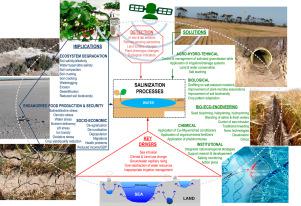Science of the Total Environment ( IF 8.2 ) Pub Date : 2020-09-21 , DOI: 10.1016/j.scitotenv.2020.142432 Gabrijel Ondrasek , Zed Rengel

|
A great portion of Earth’s freshwater and land resources are salt-affected and thus have restricted use or may become unsuitable for most human activities. Some of the recent scenarios warn that environmental salinization processes will continue to be exacerbated due to global climate change. The most relevant implications and side-effects in ecosystems under excessive salinity are destructive and long lasting (e.g. soil dispersion, water/soil hypersalinity, desertification, ruined biodiversity), often with non-feasible on site remediation, especially at larger scales. Agro-ecosystems are very sensitive to salinization; after a certain threshold is reached, yields and food quality start to deteriorate sharply. Additionally, salinity often coincides with numerous other environmental constrains (drought, waterlogging, pollution, acidity, nutrient deficiency, etc.) that progressively aggravate the threat to food security and general ecosystem resilience. Some well-proven, widely-used and cost-effective traditional ameliorative strategies (e.g. conservation agriculture, application of natural conditioners) help against salinity and other constraints, especially in developing countries. Remotely-sensed and integrated data of salt-affected areas combined with in situ and lab-based observations have never been so easy and rapid to acquire, precise and applicable on huge scales, representing a valuable tool for policy-makers and other stakeholders in implementing targeted measures to control and prevent ecosystem degradation (top-to-bottom approach). Continued progress in biotechnology and ecoengineering offers some of the most advanced and effective solutions against salinity (e.g. nanomaterials, marker-assisted breeding, genome editing, plant-microbial associations), albeit many knowledge gaps and ethical frontiers remain to be overcome before a successful transfer of these potential solutions to the industrial-scale food production can be effective.









































 京公网安备 11010802027423号
京公网安备 11010802027423号